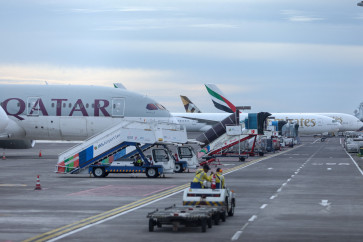Popular Reads
Top Results
Can't find what you're looking for?
View all search resultsPopular Reads
Top Results
Can't find what you're looking for?
View all search resultsLaksmi Pamuntjak: Beauty of the abyss
Poet and writer Laksmi Pamuntjak paints a new reality to the country’s 1965 tragedy
Change text size
Gift Premium Articles
to Anyone
P
/span>Poet and writer Laksmi Pamuntjak paints a new reality to the country’s 1965 tragedy.
The slim figure of writer and poet Laksmi Pamuntjak wanders around Aksara bookstore at a mall in Central Jakarta, saying hello to some guests while mingling with others at the launch of her latest work, Amba.
After an eight-year hiatus, Laksmi has successfully completed her work of historical fiction, which she started in 2003.
The novel is a modern take on the story of Amba and Bhisma from the Mahabharata epic. The chronicle is set against the backdrop of the bloody historical events of 1965 and the penal colony of Buru Island, an island in the western part of Maluku.
Laksmi is already known for her five editions of The Jakarta Good Food Guide in 2001-2003 and 2008-2009. She also published her second poetry collection, Anagram, in 2007. Later in 2007, she translated Gunawan Mohammad’s collection of aphorisms, On God and Other Unfinished Things.
“I’m a determined person, bordering on the obsessive. I’m curious and omnivorous, meaning that I’m interested into so many things,” said the 41-year-old on the sidelines of her new book launch.
Raised by parents Mustafa and Endang Pamuntjak, who owned a business in publishing, books have always been close to Laksmi.
“It was a natural thing for me [to become a writer]. I’ve known poetry since I was a kid, but I chose to study it seriously in 2003,” says Laksmi, who also produced a treatise on violence and The Illiad entitled Perang, Langit dan Dua Perempuan (War, Heaven, and Two Women) along with her first collection of short stories, The Diary of R.S.: Musings on Art in 2006.
The co-founder of Aksara bookstore said that she grew up with a one-sided version of history from school in the 1970s.
“I recall being very disturbed by that. We were taught categorically — with no room for other interpretations — that communists were atheists and the enemy of the Indonesian state, that the Indonesian Communist Party was responsible for the killings of the generals on Oct. 1, 1965, and that all communists were evil,” she said.
The thing that disturbed Laksmi was ignorance associated with this teaching.
“Not only did whole generations become so schooled in silence or forgetting thanks to the dominance of New Order’s official history and training in the regime’s version of Pancasila ideology, but also that there is now a generation that is wholly ignorant of that period of history.”
This brought her to the writing of Amba. She had the chance to visit Buru Island with ex-political prisoner and Tempo magazine senior editor Amarzan Loebis in 2006.
Despite some actual settings in the novel, Laksmi realized that she was not a historian who was writing a history book. Instead she preferred to toy with her imagination.
“I have also been fascinated with mythology. I find so much liberation and fun in reinterpreting characters from mythology — giving them a new voice, as it were,” said Laksmi, whose debut poetry book, Ellipsis, was listed among the books of the year in 2005 by The Herald of the UK.
Laksmi intends to break away from the stereotype of women writers, who, according to her literary heroine Jeanette Winterson, “always write about experiences — the compass of what they know — while men write wide and bold — the big canvas, the experiment with form.”
“Poetry is a form that liberates me most from nationalism, ethnicity — indeed, from any strict, circumscribing, categorization — as it gives voice for the multiple identities in me. But in writing a story like Amba, I realize I am very much reliant on ‘the duty of memory’,” said Laksmi, who developed her writing skills by freelancing for Tempo and The Jakarta Post.
Looking simple yet elegant in her dark tank top with a pashmina scarf plus denim pants and heels, Laksmi said that she was still a person who needed light, beautiful and inspirational things to equal out her passion for social and political issues. She gained her bachelor’s degree with first class honors in Asian studies and political science from Murdoch University in Perth in 1993.
The wife of economist Kurnya Roesad said she was an accomplished reader and enjoyed traveling and painting galleries.
“But above all, I really like music and poems,” said Laksmi. “I oddly find that every time I’m about to produce any piece, I will start the process with reading poetry.” she says.
Laksmi mentioned an endless list of poets she liked. Among them were T.S. Eliot, Philip Larkin, Wallace Stevens, Pablo Neruda, Kay Ryan, Chairil Anwar and Sapardi Djoko Damono.
If it wasn’t for a socialism chapter on The Road to Wigan Pier by George Orwell, we may not have had Laksmi’s witty work to sample today.
“I read the book over and over and the socialism part really changed me,” said Laksmi, adding that she also loved to read painting and film criticism by the critics Robert Hughes and Pauline Kael.
“Writing is about having the knowledge, and how we address the world. And I find that arts are very important. I consider The Diary of R.S.: Musings on Art as a work that satisfies my soul.”
Amba
Laksmi Pamuntjak
Gramedia Pustaka Utama, 2012
494 pages










